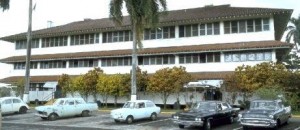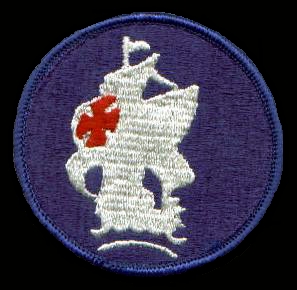Basic training, which normally took three months, in my case, lasted six months because it was infantry basic. Some of us were assigned to specialized schools which lasted three months, but as I didn’t have any of the skills the army required, it was infantry for me, and an extra three months at Fort Dix. I would have much preferred having gone to Signal Corp or some of the other specialized schools, I wasn’t too unhappy about being infantry. I didn’t find it easy, I found it challenging when I relished a challenge, and I was generally a good soldier and an expert marksman with the rifle. I also got to box occasionally, something I had done in elementary school and later in high school and at the settlement houses. Amateur boxing was popular in those days among boys and young men. Although I’d gained some weight (I was now 6’3’’ and a trim 175 lbs.), I wasn’t really bulky enough for the ring, and yet every now and then I’d box someone for entertainment, the audience’s and mine. My last fight was against a semi-pro, who knocked me out in the first round. After that, enough of boxing.
Basic ended and we were transferred to Camp Kilmer, to await orders for overseas posting. We were all afraid of being sent either to Korea, where it was really, really cold and the war could heat up again, or to Alaska, where it was not only too cold, but everything was really expensive. I was hoping, because I spoke French and German, that I’d be sent to Europe. However, one of the things I had learned in basic was that there were always three ways of doing things: the right way, the wrong way, and the Army way. Characteristic of the Army way was that it didn’t make any sense. I was assigned to Fort Davis, Panama Canal Zone.
The trip to Panama was nothing special. None of the luxuries provided on the Scythia were available. It was your plain, no frills, troop ship. In the ship library I found a record album of George Gershwin’s “Porgy and Bess”, my introduction to opera, and I immediately loved it, and don’t really know how many times I listened to it. The rest of the time aboard, I was sea-sick again. I had believed that you could only be sea-sick the first time you sailed. That was obviously a myth. After another day or so, possibly longer, we reached our destination on the Atlantic side of the Isthmus, spent a little time at an Army installation called Fort Kobe, where I again went to the library to listen to “Porgy and Bess”. A bus arrived and some of my fellow infantry men and I were taken to our new quarters, Fort Davis, which looked and felt exactly like Schofield Barracks in the movie version of “From Here to Eternity”. Unsurprisingly, I felt I was living a movie.


You must have some good stories from Panama. My dad sure did from his days there in WWII when he was a sailor.
Yes, I do have some stories, but not all are fit for a family publication 😉
You were right in your analysis of the Army and the non-sensical way they treated you. Instead of wasting everyone’s time by sending you to an extra three months of infantry training they should have sent to an advanced course in German and shipped you to Berlin.
There was always a need for translators to listen in on the East Germans and transcribe their conversations.
This is typical government.
There might have been a need for translators, but not for me. The nation survived without me as a translator, although I think I would have enjoyed being in Berlin at that time.